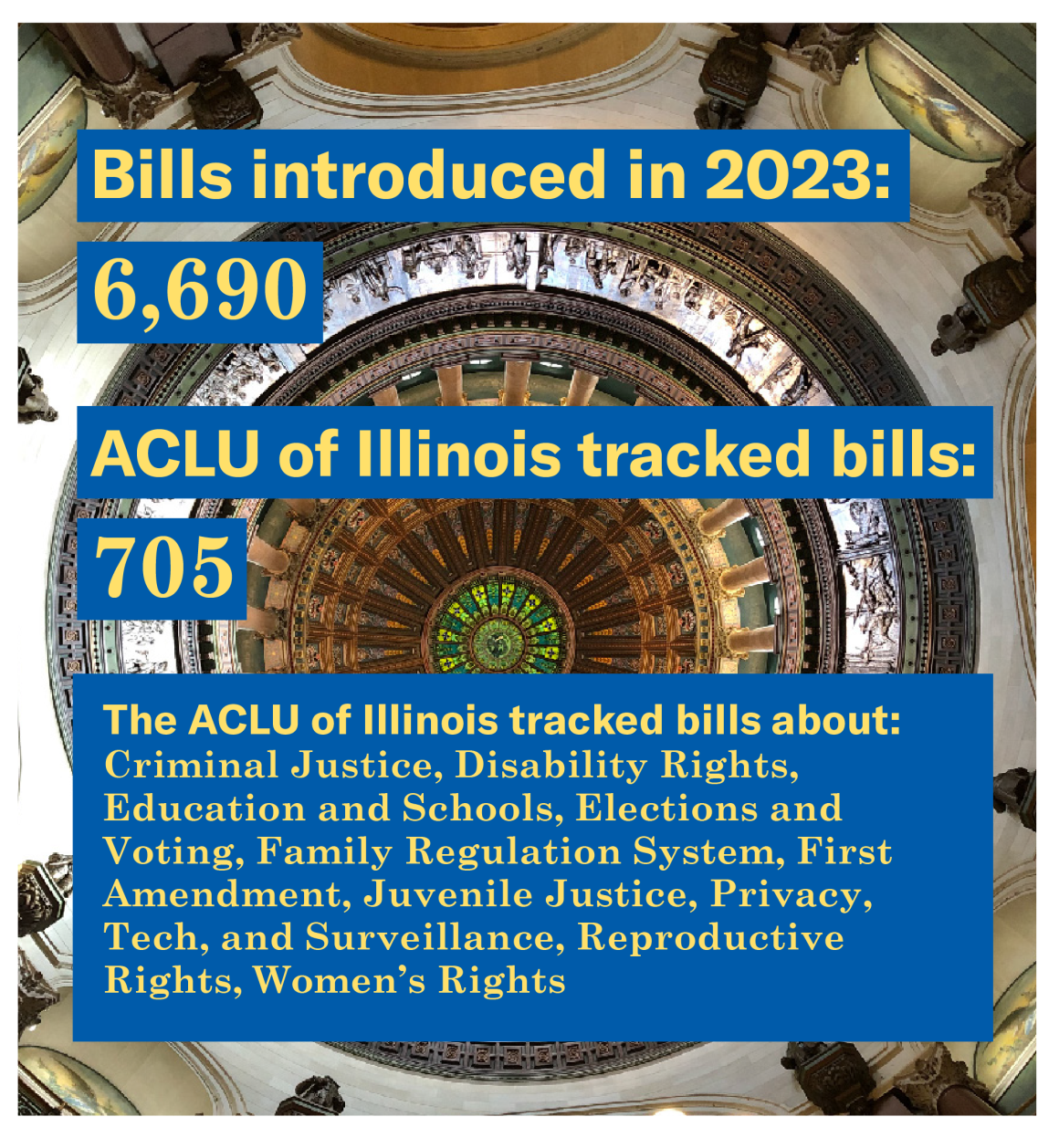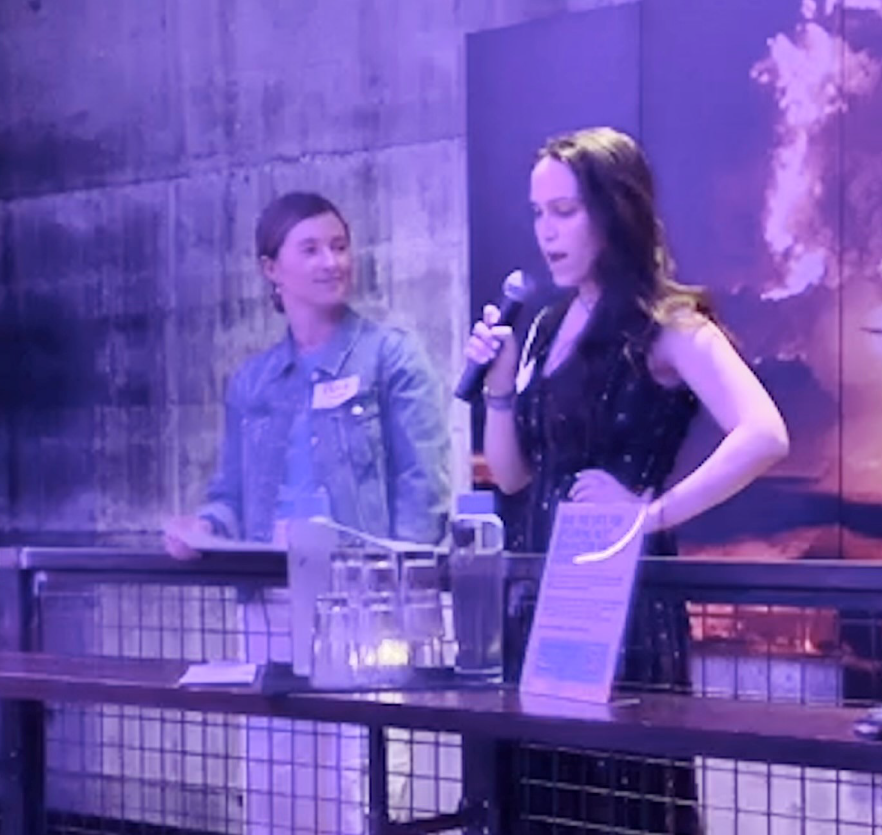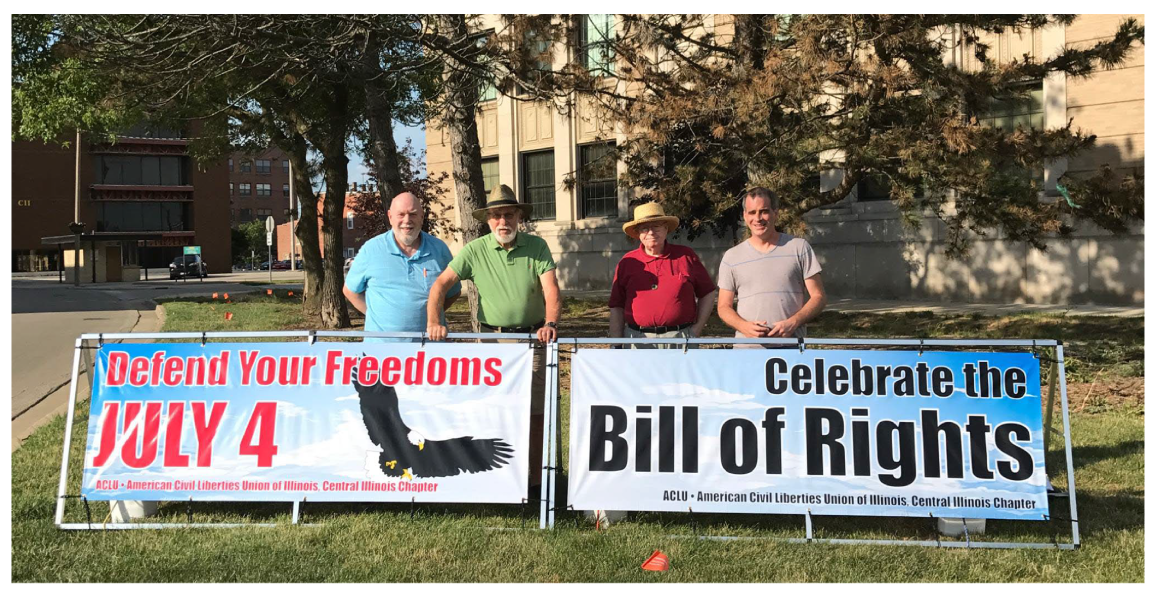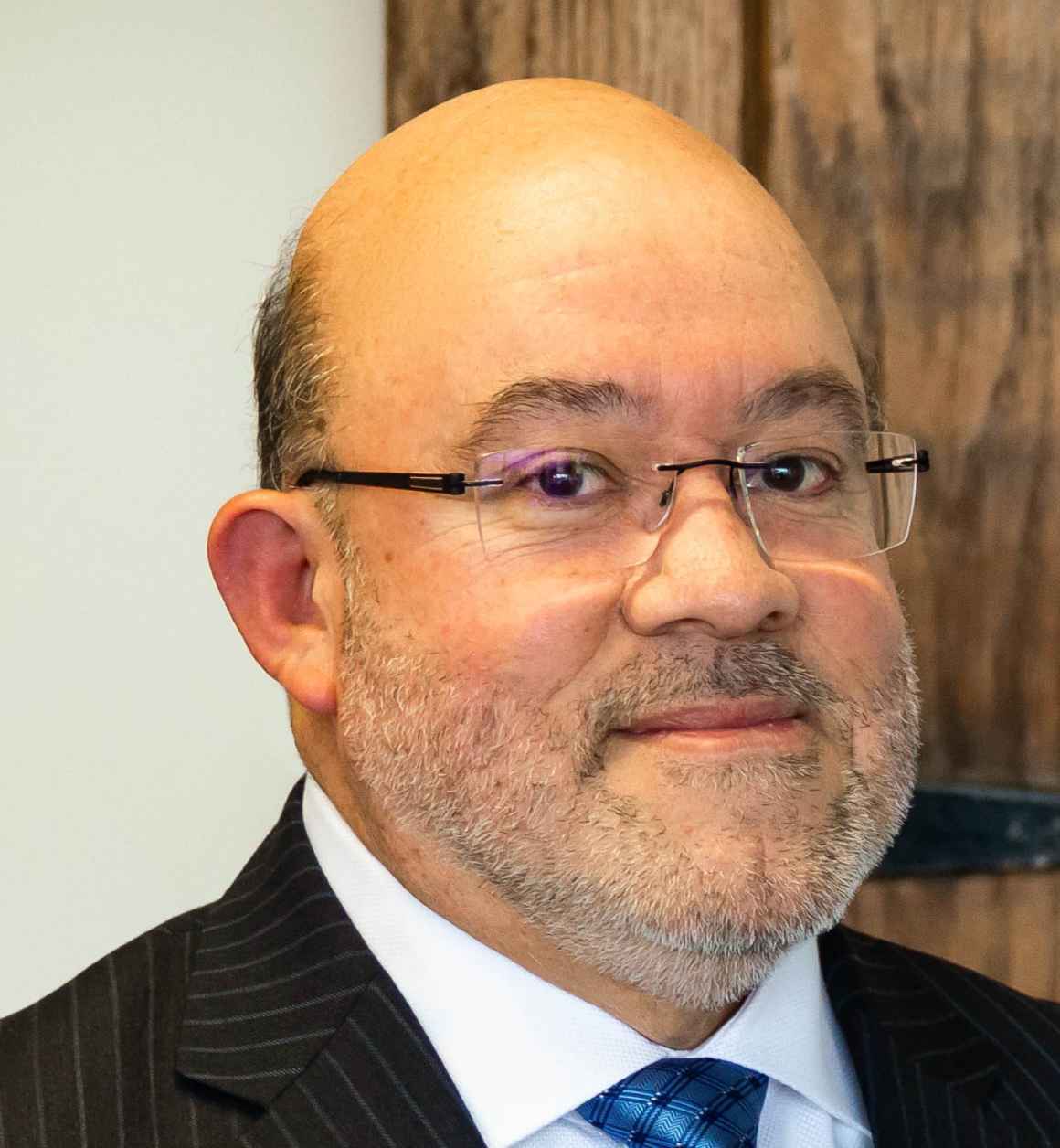We must challenge the fear mongering that suggests that civil rights laws that protect access to public accommodations are a threat to people’s safety or personal autonomy. We all benefit from a society that is equitable and open to all.
Letter from the Executive Director
A note from ACLU of Illinois Executive Director, Colleen Connell (she/her)
The Supreme Court term that just ended once again revealed that a majority of the Court stands ready to ignore precedent and the clear text of the law to reach the results that limit civil right and civil liberties. While the Court declined to further weaken the Voting Rights Act and rejected the so-called independent state legislature theory (a theory that would have stripped state courts of any authority to review election laws, theoretically allowing partisan state legislatures to override the electoral decisions of voters) other cases further challenged our work to advance freedom and equity for all in our society.
In 303 Creative v. Elenis and Students for [Un]fair Admissions v. Harvard, the Court does serious harm both to our constitutional structure and to our national community by limiting the ability of Congress and state legislatures to enact affirmative civil rights protections and by restricting efforts by governmental and private institutions to remedy past discrimination. These decisions lock in place a bigoted status quo, making it harder to undo this country’s history of discrimination against people of color, LGBTQ people, women, and other marginalized people.
In 303 Creative, the Court limited the reach of the Colorado Anti-Discrimination Act, and potentially every state and federal law prohibiting discrimination against LGBTQ people, women, people of color and people with disabilities. The Court held that a website designer had a right under the First Amendment’s protection to refuse to design a wedding website for same sex couples. The website designer claimed that she had religious objections to same sex marriage and that creating a wedding web site for a same sex couple would require her to use her creative abilities to “speak” in support of something that she opposed. The majority opinion rode rough shod over centuries of both English common law and American constitutional law requiring businesses – places of public accommodation – to serve all members of the public. As Justice Sotomayor noted in dissent, this marked the first time that the Court had granted a business open to the public a constitutional right to refuse to serve members of a protected class of people. The majority opinion opens the door to a flood of business refusals to serve classes of people with whom they have a religious or philosophical disagreement and raises questions about whether similar anti-discrimination protections in the federal 1964 Civil Rights Act will hold up. In short, this decision raises questions about whether the Court will continue to limit the remedial powers the Constitution grants Congress under the 13th, 14th and 15th Amendments to remedy discrimination.
The decision in Students for [Un]fair Admissions portends similar restrictions on Congress and state legislatures to remedy discrimination and for private parties to act in ways that seek to undo the harms of centuries of past discrimination. In this case, the Court held that the 14th Amendment prohibits state and private universities from using race conscious admissions policies. Days after the Court issued this decision, several State Attorneys General served notice on the CEOs of Fortune 100 companies that their efforts to diversify their companies raised questions of discrimination, despite the “benign” intent. Similarly, Senator Tom Cotton has challenged the DEI efforts of large law firms.
In reaching these decisions, the majorities in both cases disregard both the history of discrimination on the basis of race, gender, sexual orientation and gender identity – and elevate a selective and perverse reading of the “original” Constitution. The Constitution that emerged in 1787 discriminates on the basis of gender – only white men could vote – and the basis of race, with its recognition and de facto protection of slavery with the clause that counted enslaved persons as only 3/5th of a person for purposes of taxes and apportioning the House of Representatives. The 13th, 14th and 15th amendments to the Constitution were intended to repudiate these provisions. These amendments were race conscious and were intended to allow Congress to enact legislation to remedy the harms of slavery.
To ignore this constitutional history, to insist that the Constitution is race neutral and that efforts to undue this past discrimination is itself discrimination on the basis of race forbidden by the 14th Amendment, is perverse. The Court similarly disregards the sordid history of discrimination against LGBTQ people in the Creative 303 ruling. These decisions sadly threaten to undo 60 years of civil rights legislation and DEI efforts by educational institutions, business, and non-profits.
We cannot acquiesce in these efforts to handcuff federal and state legislative efforts as well as private action that challenge discrimination. We cannot give up on our efforts to pursue a “more perfect” union in which discrimination on the basis of race, gender, sexual orientation, and gender identity is eliminated. We must recommit to drafting legislation that identifies – and documents – the harms we seek to address; we must defend those laws with substantial evidentiary showings in courts of law; and, most importantly, we must commit to persuading other Americans that diversity and equity efforts in public institutions and businesses are NOT a zero-sum game. We must challenge the fear mongering that suggests that civil rights laws that protect access to public accommodations are a threat to people’s safety or personal autonomy. We all benefit from a society that is equitable and open to all.
Supreme Court Term in Review
Supreme Court Term in Review: Spotlight on Civil Liberties Cases
The 2022 U.S. Supreme Court term ended with several devastating losses for racial justice, LGBTQ+ rights, affirmative action, educational opportunity, and more. The impact of these decisions will reverberate for generations, and the ACLU will continue to fight to not only restore and protect these rights, but to cement and expand them. There were also several substantial victories this term that will set us up to advance our work ahead. The critical civil liberties cases from this term included:
- Allen v. Milligan: SCOTUS upheld the power of the Voting Rights Act and protected the rights of Black voters in Alabama in a case won by the ACLU and our partners at the ACLU of Alabama and the Legal Defense Fund.
- Biden v. Nebraska and Department of Education v. Brown: SCOTUS struck down the Biden administration's student debt relief plan, impacting an estimated 43 million eligible borrowers. This ruling, along with the decision to restrict affirmative action programs, represents a huge blow to educational opportunity for all.
- Brackeen v. Haaland: SCOTUS issued a landmark victory for tribal sovereignty this term by rejecting all the constitutional challenges to the Indian Child Welfare Act (ICWA) – requiring state courts to make active efforts to protect Native children and keep Native families together.
- Moore v. Harper: SCOTUS rejected a radical legal theory that threatened our democracy – upholding that state legislatures do not have the power to ignore their own state constitutions while making rules for federal elections.
- Students for Fair Admissions v. Harvard and Students for Fair Admissions v. UNC: SCOTUS struck down Harvard and UNC's affirmative action programs, restricting the schools' ability to fully address systemic racial inequalities that persist in higher education.
- 303 Creative v. Elenis: SCOTUS ruled in this case that certain businesses have a right to discriminate when selling customized, expressive services – opening the door to any business that claims to provide customized services to discriminate against historically-marginalized groups. The decision is fundamentally misguided.
Supreme Court Term in Review Event
The ACLU of Illinois, ACS Chicago Lawyer Chapter, Mayer Brown, and Public Interest Law Initiative hosted our annual Supreme Court Term event on Wednesday, August 2, 2023. The event featured Michelle García, Aziz Z. Huq, Steve Sanders, Steven D. Schwinn, Michael A. Scodro, and Carolyn Shapiro. Panelists reviewed some of the major cases from the 2022 U.S. Supreme Court Term including cases on affirmative action, LGBTQ+ rights, democracy, redistricting, the Indian Child Welfare Act, and health care and our social safety net. If you were unable to join us or would like to re-watch the event, the closed-captioned recording is available here
Updates on the Fight for Rights and Liberties
2023 Illinois Spring Legislative Session
The 2023 Spring Legislative Session concluded in May and the ACLU of Illinois and our partners worked on legislation on a range of issues to advance our civil rights and liberties. Three important pieces of legislation that passed the Illinois General Assembly and were signed into law by Governor Pritzker are:
- Gender Inclusive Language Child Welfare Statute: House Bill 1596 modernizes the language used in the child welfare and family court system. The updated language better reflects modern family structures and affirms LGBTQ+ children in the Department of Child and Family Services (DCFS) system. Adopting gender inclusive language promotes equity and respect for all people.
- Anti-Bullying Statute: House Bill 3245 makes necessary updates to Illinois’ anti-bullying law and expands the protected categories under our state anti-bullying law to include those who are pregnant and parenting, socioeconomic status, academic status, physical appearance, and those experiencing homelessness. All students deserve an educational experience that is free from bullying and harassment.
- Privacy Protections for those Seeking Abortion Care: House Bill 3326 was signed into law by Governor Pritzker that would bar local law enforcement in Illinois from sharing information from automatic license plate readers (ALPRs) with other states that might use the information to punish those travelling to Illinois to seek abortion care.
We are grateful to our bill sponsors in the General Assembly for championing these initiatives and to Governor Pritzker for signing them into law.

We also raised concerns and worked to improve bill language on a variety of issues during legislative session including the drone legislation that the General Assembly passed, and the Governor signed into law. This measure expands the circumstances under which law enforcement can use drone surveillance. The bill made changes to a 2013 law that limited law enforcement’s use of drones to situations where they had secured a warrant along with some exigent circumstances. The new bill, on which the ACLU took no position, allows police to use drone surveillance for parades and events sponsored by a governmental entity. We worked to limit the time that police can retain the data captured by the drone to 24 hours and add reporting and transparency requirements for agencies using drones. And, we pushed back against efforts to gut the protections of the Biometric Information Privacy Act (BIPA), one of the strongest privacy laws in the country.
We will continue our advocacy during the fall Veto Session and 2024 Legislative Session, including our efforts to protect health data privacy, enhance data collection in civil asset forfeiture cases, assure legal counsel to youth in DCFS, and reduce barriers to recovery. We look forward to continuing to work with the General Assembly and fighting for the rights of Illinoisians. Thank you for taking action and stay tuned for more information on the work ahead.
Fighting to End Unlawful and Discriminatory Traffic Stops
The ACLU of Illinois filed a discrimination lawsuit against the Chicago Police Department (CPD) seeking to end CPD’s mass traffic stop program, which targets Black and Latino drivers for unnecessary and, far too often violent, traffic stops. The five Chicago residents whom ACLU of Illinois represents in the lawsuit have been pulled over more than 50 times combined since 2017. As reflected by their experiences, our lawsuit asserts that CPD, through its mass traffic stop program, unlawfully harasses, racially profiles, and demeans hundreds of thousands of Black and Latino Chicagoans each year. Our lawsuit seeks to prohibit CPD from targeting predominantly Black and Latino neighborhoods for a high volume of traffic stops, bar the use of traffic stops as an excuse to search for contraband like weapons or drugs, and end traffic stop quotas. We remain committed to working to push for a public safety system that is equitable, accountable, more community led, and ensures that all people are safe to live and thrive.
This year marks the 20th anniversary since Illinois enacted legislation mandating data collection about traffic stops conducted by law enforcement in the state. The recently released data for 2022 shows that Black and Latino drivers continue to be stopped and searched at rates far above those for white drivers. Across the state, drivers of color are much less likely to be stopped for speeding than white drivers, but much more likely to be stopped for low-level equipment and licensing violations like having expired tags. These racial disparities have been persistent and continuous over the two decades that the data has been collected and reported.
Challenging the Conditions at Franklin County Juvenile Detention Center
The ACLU of Illinois filed a federal lawsuit challenging the conditions at the Franklin County Juvenile Detention Center (JDC) on behalf of a young person detained at the facility. The lawsuit describes the horrific, inhumane conditions that youth housed at Franklin County JDC experience. Our client, along with several young people currently or recently detained at Franklin County JDC, describe being locked into cells the size of parking spaces for 20 to 24 hours a day, unable to flush their own toilets, and struggling to sleep under fluorescent lights that never turn off. They are also not provided any meaningful mental health care or provided meaningful schooling. This comes after the Illinois Department of Juvenile Justice’s audit of the facility concluded that it was a “facility in crisis” in August 2022, and reaffirmed its main findings in a June 2023 follow-up report. Our complaint asks the federal court to ensure that immediate steps are taken to address the harm caused by the constitutionally inadequate conditions and lack of services experienced by youth as young as 11 years old. Read more about the case here.
Illinois Supreme Court Upholds Ending Money Bond
On July 18, the Illinois Supreme Court issued the strongest possible decision finding the Pretrial Fairness Act (PFA) constitutional and directing courts across the state to implement the law and end the use of money bond on September 18, 2023. This ruling overturns a decision by a Kankakee County judge that sided with State’s Attorneys who challenged the law’s implementation. Every year, Illinois incarcerates a quarter million people in its county jails, most of whom are jailed only because they cannot afford to pay a money bond. Ending money bond addresses both economic justice and racial justice issues in the pretrial system and improves community safety by keeping millions of dollars in our state’s most marginalized communities. Giving people the opportunity to stay in their communities while awaiting trial enables them to keep their jobs, housing, and custody of their children. From the moment the PFA was passed as part of the SAFE-T Act in 2021, opposition to the law used fearmongering and misinformation to derail its success. With this positive ruling, it is essential that county officials put politics aside and work towards implementing the law.
Aurora Pride Secures Win in Challenge to City Ordinance
ACLU of Illinois client Aurora Pride received the welcome news in May that they could move forward with their 2023 Pride Parade after a federal court blocked enforcement of an Aurora ordinance that caused the 2022 parade permit to be revoked only a few days in advance. The court found that parts of Aurora’s Special Events Ordinance could not be enforced because it allowed individual police officers the discretion to decide about the viability, scope, and cost of protected speech in the community. This lawsuit was filed in January to challenge Aurora’s Special Events Ordinance and the court agreed that police officers do not have veto power over a parade or demonstration. Aurora Pride successfully hosted their 2023 Parade in June and aims to build hope and support for the LGBTQ+ community in Aurora.
Abortion Rights and Access One Year Post-Dobbs
June 24 marked one year since the Supreme Court shamefully overturned Roe v. Wade and ruled that there are no federal constitutional protections for the right to have an abortion. Millions of people are now living in states with near-total abortion bans in effect and we continue to see bans signed into law in states nationwide. This is about abortion rights and much more. The same people seeking to control the bodies of women and pregnant people are coming for our right to access birth control, to access gender affirming care, to marry whom we love, and to vote. The ACLU, alongside our partners, supporters, and activists, is pushing back nationwide.
As an access state surrounded by hostile states, it is critical that we remain vigilant and continue to address the urgent issues affecting patients, abortion providers, and those providing assistance to people seeking abortion care. Our ongoing work in Illinois includes:
- Monitoring and analyzing the legal landscape and its impact on providers and patients.
- Developing strategies to challenge attempts by states hostile to abortion to reach into Illinois and attempt to interfere with abortion care in this state.
- Successfully passing the Patient and Provider Protection Act which reinforces protections for abortion and gender-affirming health care in Illinois.
- Pushing back against a “sanctuary city for the unborn” ordinance in Danville, Illinois.
- Affirming that the rights protected by the Reproductive Health Act and other state laws apply equally to all pregnant people.
- Working on recently passed legislation that would bar local law enforcement in Illinois from sharing information from automatic license plate readers with other states that might use the information to punish those traveling to Illinois to seek abortion care.
As we saw in the midterm elections, voters demonstrated that abortion is a non-partisan issue that is worth fighting for. The ACLU’s nationwide efforts have included suing 11 states to block abortion bans, engaging in advocacy around anti-abortion organizations’ effort to ban mifepristone, and launching the Abortion Criminal Defense Initiative. The fight will be long, but the ACLU’s more than 100-year history has prepared us for this moment. We will not give up until every person can access the essential care they need.
Engaging Together Around the State
Next Generation Society Recent and Upcoming Activities

In July, the Next Generation Society Board held elections for the open positions. We reached out to community members to encourage people to run and received candidate applications from individuals who are excited and passionate about the work of the ACLU. We are grateful to the Board Members who are stepping off this year for all they have done to build and sustain this Next Generation Society, and we look forward to working with the new Board Members.
Please save the date for the 2023 Next Generation Society Fall Fundraiser which will be held on Wednesday, October 25, 2023 from 6:00 – 9:00 PM. The Fall Fundraiser will be held in person at the Walden Chicago and there will be food, drinks, a DJ, a compelling program, and more. We encourage you to purchase your individual tickets before September 8, 2023 to take advantage of early bird pricing!
2023 Fall Engagement Campaign Preview: Right to Learn: Fighting Book Bans and Censorship
This Fall, the ACLU of Illinois will engage supporters throughout Illinois in a public engagement campaign titled Right to Learn: Fighting Book Bans and Censorship. We are in a new era of censorship as the number of book bans and other forms of content censorship are increasing, threatening our fundamental principles of free speech and intellectual freedom. The campaign aims to raise awareness around this issue through a series of emails, events, tools, and actions that will highlight the ACLU’s work, encourage people to act in their own communities, and cement the importance of a vibrant First Amendment to our democracy. A combination of in person and virtual events will take place around the state, so please keep an eye out for our campaign launch email – we might be coming to a city near you!
Overdose Rally & Resource Fair: August 28, 2023
On Monday, August 28 from 3:00 – 7:00 PM, our partners at the Illinois Harm Reduction & Recovery Coalition will be holding the End Overdose Now Illinois Rally and Resource Fair at Federal Plaza in Chicago. Illinois is losing ten people daily due to unintentional drug overdoses, more than from any other accidental death. This event aims to raise awareness about the importance of overdose prevention/response and hard reduction and advocate for compassionate and evidence-based approaches to support individuals affected by overdose. The ACLU is a co-sponsor of the event and we encourage you to register for the rally and resource fair here.
Recent ACLU of Illinois Chapter Activities:
- In May, the Springfield Chapter participated in the Springfield Pride Parade. On June 17, the Chapter walked in the Springfield Juneteenth parade. Springfield Chapter President Ken Page recently presented to Senior Citizens of Springfield and attended a Community Conversation with seven churches on celebrating queerness.
- The Champaign County Chapter worked to advocate for reproductive healthcare access and support local groups pushing back against Danville’s decision to create a “sanctuary for the unborn.” The Chapter also recently spoke to local groups on bail reform, supported county board initiatives on the rights of elderly people and recently released prisoners, and participated in the search for the new Urbana police chief.
- The Peoria Chapter participated in two Pride events locally – the Pride Annual Picnic and River City Pride Fest. The Peoria Chapter also participated in SlutWalk – an international event for advocacy against the stigma and abuse that sex workers endure – for the third year and gave out free Narcan at all of these events.
- The Central Illinois Chapter continued a 60 year tradition earlier this summer by displaying a sign in Downtown Bloomington to celebrate the 4th of July and the Bill of Rights of the U.S. Constitution. The Chapter also had a table at Pride Fest in Downtown Bloomington on July 29 and shared ACLU information at the event.

Ask the Expert

The following question was answered by Alexandra Block (she/her), ACLU of Illinois Senior Supervising Attorney, Criminal Legal System and Policing
The ACLU of Illinois’ recent lawsuit alleges that the Chicago Police Department’s (CPD) mass traffic stop program violates the 14th Amendment’s Equal Protection Clause as well as federal and state civil rights laws. Data continues to show vast racial disparities in who law enforcement targets with traffic stops. How is the mass traffic stop program being used by CPD and what are some of the solutions we are hoping to see as an outcome to our lawsuit?
CPD’s mass traffic stop program is just the newest chapter in its long and sordid history of employing mass-stop policing tactics that discriminate on the basis of race and ethnicity, touted as a campaign to supposedly fight crime in Chicago. CPD made about 2.6 million traffic stops in 2016-2022. Our lawsuit alleges that CPD stops Black drivers roughly 4 to 7 times as often as white drivers, while Latino drivers are stopped about twice as often. We claim that the disparities arise because CPD both targets predominantly Black and Latino neighborhoods in Chicago for high volumes of traffic stops and racially profiles Black and Latino drivers, especially in predominantly white neighborhoods.
Most of these stops are pretextual, meaning they are not for the purpose of roadway safety. Officers typically stop a driver of color for a low-level violation like an expired registration tag, use the stop as an excuse to harass and interrogate the driver about guns or drugs, and sometimes ask to search the car. We allege that CPD’s mass traffic stop program does not advance public safety or address crime. In more than 99.5% of stops of Black and Latino drivers, CPD did not recover any contraband.
The suit seeks to prohibit CPD from targeting predominantly Black and Latino neighborhoods for a high volume of traffic stops, bar pretextual stops as an excuse to search for contraband like weapons or drugs, end traffic stop quotas, and transfer authority to enforce non-moving traffic violations away from armed law enforcement.
ACLU of Illinois Community Spotlight & Who Else You Should Know

Mario F. Garcia (he/him)
Mario has been the Executive Director of Onward Neighborhood House for nearly 20 years. He joined the ACLU in 2019 after his friend Luis Gutierrez from Latinos Progresando asked if he would be interested in joining the board. He always admired the work of the ACLU, not only because of its work but because it stood by its mission and values.
What is the mission of Onward House?
Onward House is a community-based non-profit which provides wrap-around services to Belmont Cragin and the surrounding area, the neighborhood with the largest Latino population in Chicago. Through our Food Pantry, Early Childhood Education, Adult Education, Illinois Welcoming Center for Migrants and Refugees, and co-located Healthcare Clinic run by Community Health, Onward House stands as a one-stop-shop that both fulfills basic needs and provides opportunities for stability and growth. Learn more about Onward House here.
Why is the work of the ACLU important to you and what has kept you engaged in this fight over the years?
Given the current political and economic climate confronting the United States, the work of the ACLU continues to be critical in protecting civil rights for all. These values of equity and the commitment to standing with those with less access to power are shared by Onward House, and I am honored to work in support of this cause.
How can people get involved and support the Onward House community?
Supply drives, fundraisers, volunteering, and spreading the word about Onward House and the work that we do are all incredibly valuable to this organization. Our supporters allow us to expand our impact and do far more for this community. To support Onward House with a monetary donation, please click here.
What is giving you hope right now when you think about the future of this work?
What gives me hope is the opportunity to increase the visibility and knowledge about the work that the ACLU does with the community we serve. Recognizing that each of us has the ability and the opportunity to get involved in our own way is powerful. In the last few years, I have seen community-based organizations and people of good will from various backgrounds step forward to deal with all kinds of critical situations like welcoming new immigrants, helping to protect individual rights, and supporting people during the pandemic.
What are you currently reading, watching, or listening to?
As a grandparent to three wonderful grandchildren, I find myself watching a lot of Dude Perfect on YouTube. When not with the grandkids I find myself on a kick watching mystery and police movies or shows from Spain and Scandinavian countries like Deadwind.
Take Action & Join Us
Advocate
- Message your members of Congress: Protect Trans People from Discrimination
- Message your members of Congress: Defend Reproductive Freedom Now
- Message your members of Congress: Protect Native Families
- Tell the U.S. Attorney General: Ban Discriminatory Profiling Without Exceptions
- Tell the Biden Administration: End ICE's Racist 287(G) Program
- Message your state representative: Enhance Data Collection in Civil Asset Forfeiture Cases
- Message your state legislators: Protect Health Data Privacy
- Message your state representative: Assure Legal Counsel to DCFS Youth
- Message your state senator: Reduce Barriers to Recovery
Listen
- ACLU At Liberty Podcast: 10 Years of #BlackLivesMatter: Progress and Backlash
- ACLU of Illinois Talking Liberties Podcast: Innocent until Proven Guilty
Read
- ACLU of Illinois: Sex Ed for All
- ACLU of Illinois: Public Comment in Opposition to Danville's "Sanctuary City for the Unborn" Ordinance
- ACLU National: The Historic New Law Protecting Fairness for Pregnant Workers
- ACLU National: Moving Beyond the Supreme Court’s Affirmative Action Rulings
- ACLU National: My Journey from Death Row to Becoming an Advocate for Justice
Watch
- ACLU of Illinois: Sex Ed for All
- ACLU of Illinois: Public Comment in Opposition to Danville's "Sanctuary City for the Unborn" Ordinance
- ACLU National: The Historic New Law Protecting Fairness for Pregnant Workers
- ACLU National: Moving Beyond the Supreme Court’s Affirmative Action Rulings
- ACLU National: My Journey from Death Row to Becoming an Advocate for Justice
Stay Connected
- Find out more about our work at aclu-il.org
- Follow us on social media at:
- Facebook: @ACLUofIllinois
- Instagram: @acluofil
- Twitter: @ACLUofIL
- Support our work at aclu-il.org/donate
- Sign up for Action Alerts at aclu-il.org/signup
- View open positions at aclu-il.org/careers
- Email us at ACLUofIllinois@aclu-il.org
Do you have a question about a topic pertaining to civil rights or civil liberties? We encourage you to reach out to us at engagement@aclu-il.org with your question and we may include the question and our answer in the next issue of the Impact Report.